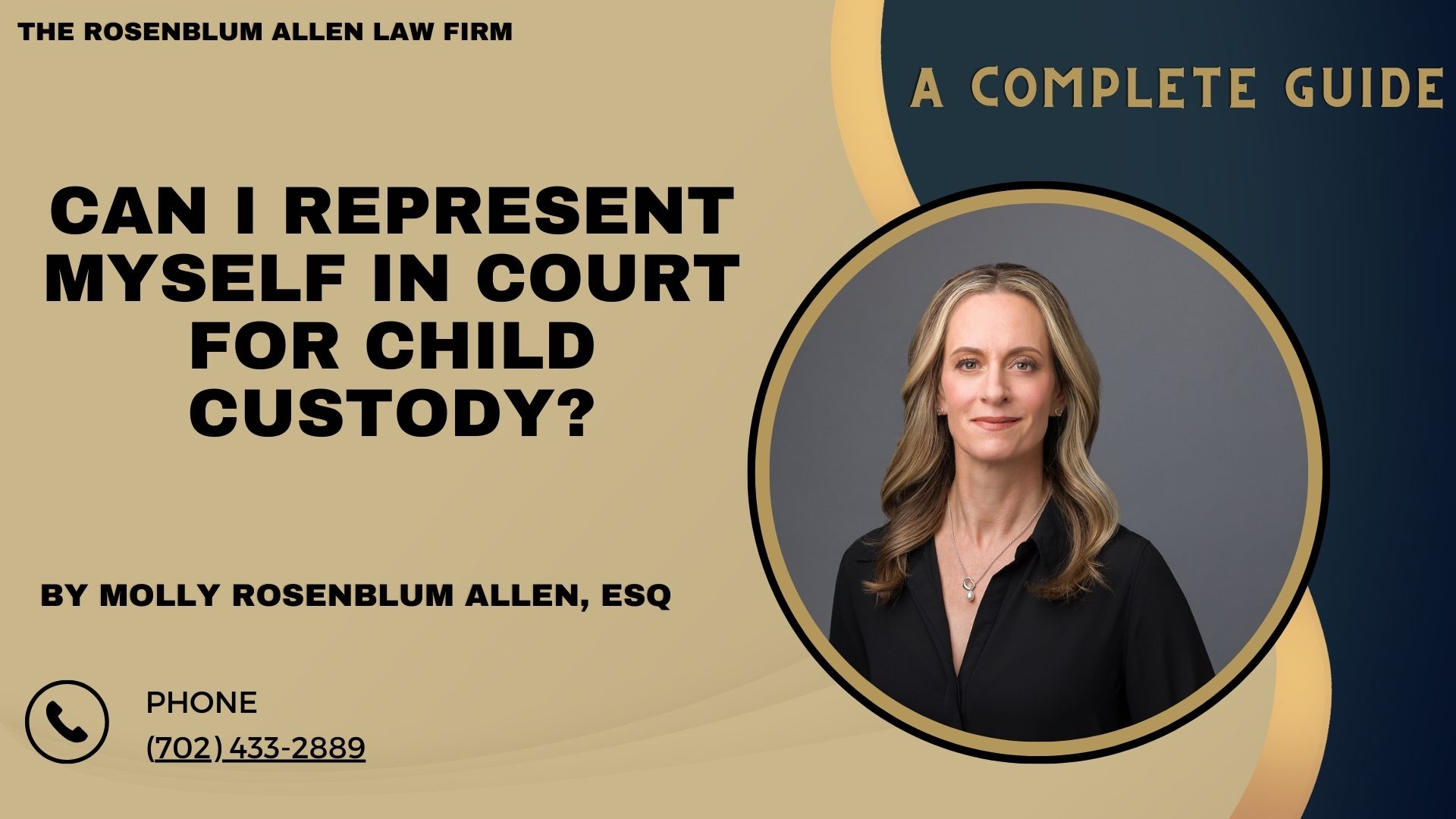Representing yourself in a child custody case is a big choice. It has both opportunities and challenges. Consider this path to save money or best represent your interests. Enter the process with a clear understanding of what’s involved. This guide helps you navigate self-representation in court, focusing on child custody.
 Understanding Self-Representation
Understanding Self-Representation
Definition of Pro Se Representation
Pro Se Representation is representing yourself in court without an attorney. Present your child custody case to the court by filing necessary paperwork and arguing your position independently.
Legal implications of representing yourself: You’re held to the same standards as a lawyer, meaning you must follow legal procedures and court rules, even if you’re unfamiliar with them.
Typical scenarios where individuals choose self-representation: Many choose this route due to financial constraints or desire direct control over their legal strategy.
Pros and Cons of Self-Representation in Child Custody Cases
Understanding the advantages and disadvantages of representing yourself is crucial before deciding.
Advantages of representing yourself:
Cost savings: Avoiding attorney fees can significantly reduce the financial burden.
Personal empowerment: Taking charge of your case can provide a sense of control and personal involvement.
Challenges and disadvantages:
Navigating complex legal procedures: The legal system is intricate, with many rules and procedures that can be challenging to understand and follow.
Potential for overlooked legal rights: With legal training, you might know all your rights and how to assert them effectively.

Legal Requirements and Preparation
Understanding the Legal Process for Child Custody
Child custody proceedings vary by jurisdiction but generally follow a set process.
Overview of child custody proceedings: Filing petitions, attending hearings, and possibly going to trial.
Key legal terms and their meanings: Familiarize yourself with terms like “physical custody,” “legal custody,” “visitation,” and “best interest of the child.”
Preparing for Court
Being well-prepared is crucial for success in representing yourself.
Gathering necessary documents and evidence:
Examples of documents to collect include birth certificates, financial records, and communication between the parents about the child.
Familiarizing yourself with courtroom procedures:
Tips for effective communication in court: Be clear, concise, and respectful. Practice your statements and responses to anticipated questions.
Filing Legal Documents
Understanding how to file legal documents properly is foundational.
How to file a custody petition:
Requirements and deadlines: Each court has specific forms and deadlines. Ensure you complete all paperwork accurately and submit it on time.
Responding to a custody action: If the other parent has filed for custody, you must respond appropriately within the court’s deadlines.
Engaging with child custody legal proceedings can feel overwhelming, especially when representing yourself. Thorough preparation and understanding requirements and strategies help present your case effectively. The guide provides strategies for building your case. It also covers legal research and courtroom preparation.

Strategies for Successful Self-Representation
Building Your Case
About child custody, the court’s primary concern is the child’s best interests. Prove your desired custody arrangement serves those interests.
How to present evidence and witnesses:
Organizing evidence for clarity: List what you want to prove and match your evidence to these points. This could include photographs, messages, and testimonies that show your involvement and stability in the child’s life.
Preparing witnesses for testimony: Choose witnesses who can credibly support your claims about your parenting and your child’s needs. Brief them on what to expect and the questions they might be asked.
Legal Research and Resources
Understanding the law is crucial. Fortunately, there are resources to help you get up to speed.
Recommended legal research techniques:
Visit your local law library or use online legal databases to research child custody laws in your state.
Utilizing public legal resources: Look for free legal clinics and online forums where you can ask questions and learn from others’ experiences.
Online tools and local legal aid societies: Many websites offer free access to legal forms and guidance on how to fill them out. Legal aid societies may also provide workshops or one-on-one consultations.
Negotiation and Mediation
Resolving custody disputes outside of court can save time, money, and stress.
The role of negotiation in child custody:
Strategies for effective negotiation: Keep the child’s best interests at the forefront, be willing to compromise, and maintain a respectful dialogue with the other parent.
Mediation as an alternative:
Preparing for mediation sessions: List your priorities and the areas you want to compromise. Mediation is about finding the best solution for the child, not “winning” the argument.

Courtroom Conduct and Presentation
Prepare your case. Understand how to conduct yourself in court to make a good impression on the judge.
Effective Communication in Court
Communicating effectively in court is about more than just what you say.
Speaking to the judge and opposing counsel:
Address the judge as “Your Honor” and always be respectful, even if you disagree with what’s being said.
Tips for clear and respectful communication: Speak, stay on topic, and avoid letting emotions get the best of you. Practice your statements and answers to potential questions beforehand.
Understanding Courtroom Etiquette
How you present yourself in court can impact how your case is perceived.
Dress code and behavioral expectations:
Examples of appropriate courtroom attire: Think business casual. You want to show the court that you’re taking the proceedings seriously.
Handling Courtroom Challenges:
Dealing with unexpected questions or situations: Stay calm. If you don’t understand a question, asking for clarification is okay. If you don’t know an answer, it’s better to say so than to guess.
Navigating a child custody case alone is challenging. Proper preparation and mindset help you advocate effectively for yourself and your child. Show that you care about your child and can offer a stable, loving home. Follow this guide. It will help you handle self-representation in child custody matters.

After the Court Decision
The conclusion of your child custody case marks the beginning of a new chapter. You know the steps after the decision are crucial. A smooth transition is important for your child’s well-being.
Next Steps Following a Court Decision
After a custody ruling, take essential actions to ensure court orders are followed. Adjust to the new custody arrangement.
Understanding and complying with the custody order:
Review the order carefully to understand all the details, including custody arrangements, visitation schedules, and any specific conditions or requirements set by the court.
Adjustments and modifications to custody orders: Life circumstances change, and requesting modifications to the custody order may become necessary. This typically requires showing a significant change in circumstances and that the modification is in the child’s best interest.
Appealing a Custody Decision
If you think the court made a wrong decision for your child, you can appeal. Consider appealing if there were legal errors. Appeals are complex. They must understanding legal procedures and appeal grounds.
When and how to consider an appeal:
Understand that an appeal is not a new trial but a review of the original decision to ensure legal procedures were followed correctly.
The appeal process explained Generally involves filing a notice of appeal, presenting a written argument (brief), and sometimes, oral arguments. Be mindful of the tight deadlines and specific requirements for filing an appeal.

Breaking It All Down
Representing yourself in a child custody case is challenging. With proper preparation and understanding, you can navigate the legal system effectively. Throughout this journey, focusing on your child’s best interests is paramount. The guide offers advice on preparing your case, acting in court, and handling the outcome.
Remember, while this guide provides a comprehensive overview, each case is unique. Seek advice from legal professionals. Use local legal resources for support and guidance.
Embark on this path. Fight for your child’s future and well-being.

Frequently Asked Questions
What is the best interest of the child standard?
The “best interest of the child” standard guides court decisions on custody. It also influences visitation determinations. It considers the child’s age, health, and emotional ties to each parent. The parent’s ability to care for the child is also evaluated. Any history of family violence or substance abuse is taken into account.
If I'm unsatisfied, can I change my lawyer and then decide to represent myself?
Yes, you have the right to change your lawyer at any time. If you choose to represent yourself without a new lawyer, inform the court that you will proceed pro se.
How do I handle communication with the other parent during the court process?
Maintain respectful and clear communication with the other parent. Focus on the child’s needs and well-being. Use written communication or tools for co-parenting. Keep a record of your exchanges.
What if the other parent has a lawyer and I don't?
Representing yourself when the other parent has legal representation can be challenging. But, it’s not impossible. Focus on being well-prepared. Conduct thorough legal research. Seek advice from legal aid services for specific questions or strategies.
Do I need to fill out any specific court forms to represent myself?
Courts often must self-represented individuals to fill out and file specific forms. One example is a “Notice of Pro Se Representation.” Check with your local court or website to find the required forms in your jurisdiction.
How can I learn about my state's specific laws and regulations regarding child custody?
You can find this information on your state’s court website or through online legal resources. Many states publish guides to help pro se litigants understand the legal process.
What should I do if I feel overwhelmed by representing myself?
Seek legal aid organizations or consult a lawyer for specific advice if overwhelmed. Some lawyers offer “unbundled” services. They assist with parts of your case without full representation.
Can you get a court-appointed attorney for a child custody case?
Court-appointed attorneys are not available for child custody cases in most jurisdictions. They are only provided in specific cases, like those involving abuse allegations. You may qualify for help from legal aid if you cannot pay for a lawyer.
How can I prepare emotionally for representing myself in court?
Representing yourself can be emotionally taxing. Consider seeking support from friends, family, or a therapist. Preparing thoroughly for the legal aspects of your case can also help reduce stress.
What are some common mistakes to avoid when representing myself?
Common mistakes include:
- Failing to follow court procedures.
- Missing deadlines.
- Being unprepared with evidence or arguments.
- Letting emotions interfere with your case.
Staying organized, adhering strictly to deadlines and court rules, and focusing on your child’s best interests can help you avoid these pitfalls.

Additional Resources for You
To further support you in your time of need, our lead attorney, Molly Rosenblum Allen, Esq., has created a comprehensive suite of resources. These guides and articles are tailored to assist you with a range of family law matters in Nevada. Here’s a brief overview of the resources available at The Rosenblum Allen Law Firm:
Las Vegas Family Law Attorneys: A detailed guide covering the breadth of family law services offered by our firm, designed to assist you with any family law issue you might face in Las Vegas. Explore Here
Family Court Las Vegas: Insights and guidance on navigating the family court in Las Vegas, including what to expect during the process. Learn More
Common Law Marriage in Nevada: An informative piece addressing the status and recognition of common law marriage in Nevada, helping you understand your relationship’s legal standing. Read Further
Name Change Las Vegas: A resource for individuals looking to legally change their name in Las Vegas, outlining the necessary steps and legal requirements. Find Out How
Nevada Power of Attorney: Essential information on establishing a power of attorney in Nevada, including types of powers of attorney and their legal implications. Discover More
How to File a Motion in Family Court: A step-by-step guide on filing motions in family court, aimed at helping you effectively present your case. Get Started
Family Court Mediation: Insights into the mediation process in family court, offering strategies for resolving disputes outside of traditional court hearings. Learn the Process
- Unbundled Attorney: Information on how unbundled legal services can offer flexible and cost-effective legal support for specific aspects of your case. Understand the Benefits
Nevada Adoption: Guidance on the adoption process in Nevada, providing valuable information for those looking to expand their families through adoption. Explore Adoption
These resources have been meticulously developed to provide you with reliable, actionable information during your legal journey. Whether you’re navigating the complexities of family court, considering adoption, or seeking to understand specific aspects of Nevada family law, Molly Rosenblum Allen, Esq., and The Rosenblum Allen Law Firm are here to assist.

Outside Resources for You
American Bar Association (ABA): A rich resource for general legal information, including guides on representing yourself and understanding family law. Visit ABA
FindLaw: Offers a comprehensive library of articles on family law, child custody, divorce, and legal representation. Explore FindLaw
National Center for State Courts (NCSC): Provides resources and information about court procedures, including self-representation in family law cases. Visit NCSC
United States Courts: Contains information about the federal court system, with resources on representing yourself in court. Explore United States Courts
National Association of Counsel for Children (NACC): An organization dedicated to advancing the legal rights and well-being of children, with resources for families navigating custody issues. Visit NACC
Child Welfare Information Gateway: Offers extensive resources on child welfare, including aspects related to child custody and family law. Explore Child Welfare Information Gateway
Psychology Today: While not a legal resource, Psychology Today offers articles and advice on dealing with divorce and child custody issues from a mental health perspective. Visit Psychology Today

A Special Message from Our Lead Attorney, Molly Rosenblum Allen, Esq

Dear Reader,
Thank you for taking the time to explore the resources we’ve put together for you. I hope you found the information valuable. It can guide you through a challenging journey. The Rosenblum Allen Law Firm team provides effective legal advice in family law. We aim to provide support through complexities.
Contact us when you are ready to take action or with any questions. Together, we can work towards finding the best possible outcome for you and your family. Please call us at (702) 433-2889 to discuss how we can assist you.
Looking forward to the opportunity to serve you,
Molly Rosenblum Allen, Esq.



